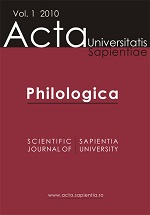Grammatical Devices for Building Spaces in Cognitive Semantics
Grammatical Devices for Building Spaces in Cognitive Semantics
Author(s): Katalin SzerencsiSubject(s): Language and Literature Studies
Published by: Scientia Kiadó
Keywords: inguistic and social categories; ethnic identity; schema theory; prototypes vs. sterotypes
Summary/Abstract: The paper sets out to investigate space in cognitive semantics from a linguistic perspective. The notion of mental spaces, from which the meaning of a sentence can be derived, plays a crucial role in cognitive semantics. In addition to reality or base space, space builders (built space) set up a mental space in the reader’s mind which may differ from the real world. Thus, the way in which language structures space requires investigation both from a linguistic and a psychological point of view. By dividing meaning into conceptualisation and knowledge representation, cognitive linguists investigate issues traditionally dealt with in pragmatics as well as semantics. A variety of grammatical forms can be used to function as space builders, out of which the paper is concerned with illocutionary adverbials and discourse particles and their role in communication. Within the relevance-theory framework an attempt is made to examine whether illocutionary adverbials and discourse particles encode procedural and/or conceptual meaning. Relying on examples from different sources and genres, the author seeks to identify the linguistic and conceptual resources in meaning construction.
Journal: Acta Universitatis Sapientiae, Philologica
- Issue Year: 4/2012
- Issue No: 2
- Page Range: 261-274
- Page Count: 14
- Language: English

